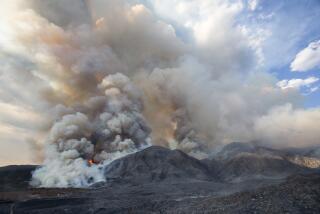Global Warming and Greenhouse Gases
- Share via
Re “Warming? More Like Global Balderdash,” Column Left, Dec. 11:
Alexander Cockburn’s comments about “nonsense about Third World overbreeding” shows he contributes his share of nonsense all right. But about the global warming scare he is right. We need more info about some basics:
How much of the warming is due to us and how much to nature? How far would a million autos have to go to contribute as much as one Mt. St. Helens eruption? How much forest land does it take to offset one L.A.’s worth of emissions per day? What causes El Ninos?
JEFF DOUTHWAITE
Santa Barbara
*
Wow, I feel so much better now. Cockburn says there’s no global warming and no population explosion! I guess I can just toss the two articles from your science page that appeared the same day as Cockburn’s good news. After all, why should I believe University of Michigan geologist Henry N. Pollack that global subsurface temperature has increased faster in the last century than before? And why pay attention to Peruvian glaciologist Benjamin Morales Arnao’s report that a large Andean glacier has receded 2,527 feet since the turn of the century? Or that this melting will disrupt agriculture, industry and water supplies? What do scientists know?
As for population, what does it matter that we increase it by 80 million or 90 million every single year? Who needs facts and figures when we have Cockburn?
ANN ALPER
Pacific Palisades
*
Shift taxes to reduce greenhouse gases. Eliminate sales taxes on cars and trucks. Eliminate automobile registration fees. Increase gas taxes to compensate. The overall tax burden for Californians would be less. Visitors to California do not pay automobile sales taxes or registration fees, but they do buy gasoline and pay gas taxes.
Californians would be motivated to drive more fuel-efficient cars, resulting in reduced greenhouse gases, less air pollution and reduced imports of foreign oil.
Automobile sales and the California economy would be stimulated. Sales taxes are now about the same as the first-year depreciation on a car. With no automobile sales tax, people could afford to trade cars more often. Also, newer cars are safer, cleaner and more fuel efficient.
People with limited incomes have difficulty making large, lump sum payments. It would be easier for them to pay their taxes in small increments as they drive and, since many already drive fuel-efficient cars, they would pay less taxes. With no auto registration fees or sales taxes, they are more likely to be able to afford to buy auto liability insurance, and they can afford later-model, even more fuel-efficient cars.
RICHARD MILLER
Laguna Hills
More to Read
Sign up for Essential California
The most important California stories and recommendations in your inbox every morning.
You may occasionally receive promotional content from the Los Angeles Times.













